新闻报道 | 2010.11.10
G20: 首尔欢迎您
安全警戒空前
据估计,大约1万人将来到1200万人口的大都会首尔参加会议,其中包括20国集团成员国的代表团,也包括大量国际组织的代表。此外,马拉维总统, 埃塞尔比亚、新加坡、西班牙和越南的政府首脑也受到了邀请。各国媒体还派出数千名记者前来报道。令人印象深刻的首先要数安全警戒措施。为了此次峰会,韩国 动用了5万名警察,仅在城南的COEX 会议中心,安全力量的人数就将远远超过记者的人数。按照一项特别法令,会议中心周围限制举行示威活动。
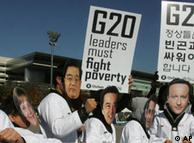 Bildunterschrift: 国际乐施会(Oxfam)的活动家在G20峰会前戴上20国集团领导人面具呼吁人们关注贫穷问题
Bildunterschrift: 国际乐施会(Oxfam)的活动家在G20峰会前戴上20国集团领导人面具呼吁人们关注贫穷问题
 Bildunterschrift: Großansicht des Bildes mit der Bildunterschrift: 安全警戒空前
Bildunterschrift: Großansicht des Bildes mit der Bildunterschrift: 安全警戒空前
聚焦发展中国家
韩国政府希望此次峰会能够给自己的形象增光添彩,尤其是在中日两个经济大国占主导的亚洲巩固自己的地位。首尔早已通过1988年的奥运会和2002 年世界杯得到了证明自己有能力举办大型活动。不过,这一次却是一次重大的政治峰会,韩国希望从中扮演发达国家与发展中国家间的调解人的角色,因此,在20 国集团峰会年年轻的历史上,本届东道主首次将发展政策议题列入议事日程。峰会结束时将通过一项不着眼于投入更多资金,而是重在促进发展中国家经济增长和私 人经济的行动计划。而韩国将成为其它国家的榜样。这个国家在过去的60年里实现了变革,从一个落后的农业国变成了一个经济繁荣的国家和高科技基地。
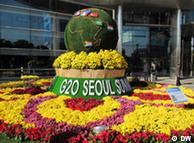 Bildunterschrift: Großansicht des Bildes mit der Bildunterschrift:
Bildunterschrift: Großansicht des Bildes mit der Bildunterschrift:
讨论经济不平衡问题
本次峰会的中心议题是金融市场改革的成果。人们希望看看,两年前华盛顿峰会通过的47项措施到底实施得怎么样。但是,有关经济不平衡影响世界经济复 苏的讨论当然也会是重要议题。所谓的经济不平衡指的是许多国家间不平衡的贸易关系。美国人早就建议,要将出口盈余限制在各国生产力的4%以内。由于无法就 此达成一致,美国总统奥巴马现在只想在首尔讨论减少贸易不平衡的措施。这对德国总理默克尔而言可以说是一种让步。默克尔一直表示反对为了调整国民经济的收 支平衡而人为干预市场进程。 默克尔和奥巴马将在峰会开始前于周四(11月11日)晚在首尔会晤。
汇率问题首次进入议事日程
在这样的背景下,20国集团峰会将首次正式讨论货币政策。最近,在有关货币争相贬值的问题上各国唇枪舌战,争论不休。但是,现在看起来,大家希望能 够找到一个妥协的办法。美国财长盖特内最近提出了一个建立早期预警系统地建议,以抑制汇率的大幅波动。由于美联储近日再次向市场注入数千亿美元,以促进本 国经济,美国遭到了猛烈抨击。汇率问题肯定无法在首尔得到解决。人们估计,法国在担任下届20国集团主席期间将更多关注这一议题。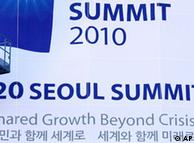 Bildunterschrift:
Bildunterschrift:
责编:谢菲
Asia | 10.11.2010
Obama travels to Seoul with multilateral ambitions
There is no shortage of issues awaiting President Barack Obama even before the G20 summit begins on Thursday in Seoul. Obama is scheduled to meet both Chinese President Hu Jintao and South Korean President Lee Myung-bak parallel to the summit.
For the latter, the most pressing agenda item will be the ratification of a pending free trade deal that US and South Korean diplomats from both sides have been hashing out over the past two days. Despite a number of sticking points, including disagreement on autos and beef trade, Myung-bak and Obama agreed in a telephone conversation last week to strive for agreement before the G20.
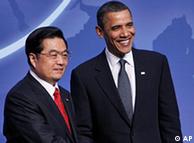 Bildunterschrift: Großansicht des Bildes mit der Bildunterschrift: Obama faces a complex meeting with Hu Jintao
Bildunterschrift: Großansicht des Bildes mit der Bildunterschrift: Obama faces a complex meeting with Hu Jintao
Yet the meeting will also be laden with symbolic value, as Howard Loewen, researcher at the German Institute for International and Security Affairs (SWP), says.
"I think they want to reaffirm the security alliance between the South Korea and the US, for the protection of South Korea," Loewen told Deutsche Welle. "Which is of course a message for North Korea and China."
Chinese tension
The meeting with Jintao is likely to be more general and possibly less conclusive, however. Apart from recent disagreements over currency issues and accusations of protectionism, the Americans are consistently calling on China to take on more responsibility.
"If you're a big country, you have the power to sit at the table in the biggest forums, but you have to be willing to take on responsibility, and I think that will be a subject of conversation," says Loewen.
For its part, China is wary of Obama's diplomacy drive in Asia, particularly US attempts to assert a position in multilateral bodies. Next year the US will join the East Asia Summit, an annual forum of east Asian countries, and Loewen believes that Obama is consciously going beyond the network of bilateral relations the US maintains with likes of Japan, South Korea, the Philippines and Thailand.
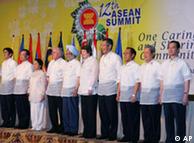 Bildunterschrift: Großansicht des Bildes mit der Bildunterschrift: The US will join the East Asia Summit next year
Bildunterschrift: Großansicht des Bildes mit der Bildunterschrift: The US will join the East Asia Summit next year
"The US is showing more diplomatic initiatives in Southeast Asia than it did in the Bush era," said Loewen. "At the same time, the US wants to engage more in the multilateral regulation of problems. You really can't say that the US is retreating in the region - on the contrary, it is pushing ahead more."
"Of course, the Chinese are not keen on seeing the US engaging themselves more," he added. "Because they fear that the US could rival their influence, which of course it does. The Chinese are getting nervous."
Multilateral vs. bilateral
Perhaps for this reason China has made one regional issue a taboo for multilateral talks. Pascal Abb of the German Institute of Global and Area Studies, told Deutsche Welle, "China has made it clear that it does not want the territorial conflicts in the South China Seas to be discussed multilaterally, but that is the central conflict in the region."
The conflict is over a number of tiny islands in the South China Seas – China, Taiwan, Vietnam, the Philippines and Malaysia all lay claim to the islands, mainly because of the rich natural resources in the area, as well as the trade routes that run through these waters. But China's refusal to allow the matter to be discussed multilaterally effectively scuppers any chance of progress.
"I don't see how overlapping territorial conflicts can be solved bilaterally," says Abb, "Simply because no third country is likely to accept an agreement that two other states have reached."
Political gamble
But for Obama, the recent mid-term elections mean that what some people call his "multilateral gamble" may be under more pressure. While the new strength in the Republican party does not extend to controlling the Senate, which has more control over US foreign policy, some believe that if Obama's attempts to assert himself in Asia do not bear economic fruit, he may hand the Republicans extra ammunition in the 2012 presidential election.
But that is still a long term concern. For now, the Republicans are unlikely to gain much traction with such attacks.
"It could be that the Republicans want to assert their foreign policies now, and may make demands like that," says Loewen. "But I think it won't be that serious, because there are no multilateral commitments. It is easier to go back on multilateral agreements, so I don't think that will play a big role."
Author: Ben Knight
Editor: Jennifer Abramsohn

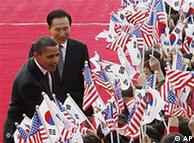
沒有留言:
張貼留言